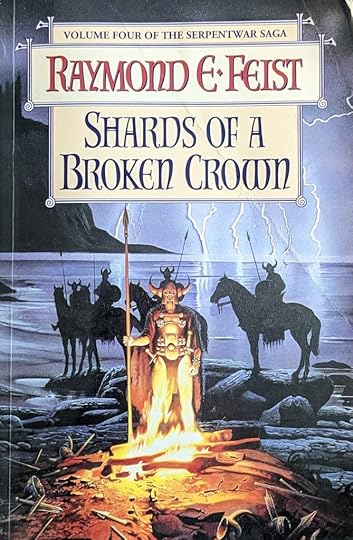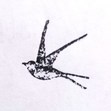Riftwar Re-Read #11 – Shards of a Broken Crown
The Serpentwar is over. The actual war has come and gone, leaving the Kingdom in ruins and many beloved characters dead – but the good guys won and the world was saved. In many stories this is where the tale would end: a little pyrrhic, but still a victory, with the implication that while there’s rebuilding to be done it’s all going to take place offscreen.
But that’s not what Feist did.
 And so ends the saga of This Guy. And in true This Guy fashion, it’s not really clear what part of the book’s plot this is meant to be. Maybe he’s been a Novindan mercenary all along, and he’s just… hanging out? Who knows? We probably never will.
And so ends the saga of This Guy. And in true This Guy fashion, it’s not really clear what part of the book’s plot this is meant to be. Maybe he’s been a Novindan mercenary all along, and he’s just… hanging out? Who knows? We probably never will.Shards of a Broken Crown is all about the rebuilding, the fallout, the consequences of the war that Feist built up for so many books. The actual invasion of the Kingdom has been thwarted and the Demon King slain… but that still leaves an enormous army of foreign mercenaries stuck in the Kingdom with no way, and no desire, to go home. And some of them are giant lizardmen. And because of all the politicking and plotting that went into the defence of the Kingdom, and because it’s now looking very weak indeed, other old enemies – particularly the desert empire of Kesh – are both feeling betrayed and looking to seize some territory.
Essentially, it’s not looking good for the Kingdom. But don’t worry, I hear you cry: surely the heroic princes of old will ride in and save the day?
Well, no. Because as previously established, all the old heroes are dead. Prince Arutha got old, Prince Nicky got shot, Jimmy the Hand got blown up. That leaves the new guard. And for the most part, they’re not up to scratch.
There’s an underlying theme in Shards of children treading in their forebears’ footsteps to varying degrees of success. Patrick, the new Prince of Krondor, is trying to live up to the massive reputation of Prince Arutha… and largely failing, because he’s impetuous, vain and doesn’t take advice well. Arutha, son of Jimmy the Hand, is also trying to live up to his namesake Prince Arutha – and though he does much better than Patrick, he fails in different ways. He’s a good man, but he’s not the Arutha of old. The point that Feist is hammering home is that nobody is the heroes of old. Even the surviving heroes like Pug and Tomas have been fundamentally changed by this conflict. The Riftwar series has undergone a big tonal shift from its beginnings, and its characters have changed with it.
As a case in point, we’ve got our new protagonists, through whose eyes we see this devastated Kingdom and the efforts to rebuild it. They’ve been side characters all series, but with all the death and destruction some opportunities have opened up for them. Enter the two grandsons of Jimmy the Hand: Jimmy and Dash.
Jimmy and Dash are a very enjoyable pair of characters to read, especially if, like me, you’re a fan of late lamented Jimmy the Hand. Because his two grandsons are just like him, but in pleasingly different ways. Both of them are very capable and multi-talented young men, but in each, different aspects of Jimmy 1 shine through as the book progresses. Jimmy the younger takes on a more public role, taking up noble office and following Jimmy 1’s path to political power. He’s shrewd and clever enough to pull it off. But Dash, on the other hand, takes on his grandfather’s less salubrious aspects. While his brother tries to rebuild Krondor from the surface, Dash ends up embroiled with the Guild of Thieves as they try and resurrect the city’s underworld. It’s a nice way to replace Jimmy the Hand: not with an identical character, but with two, each of whom honours his legacy in a different way. Because Jimmy did so damn much that it takes two lesser people to fill his boots.
There’s also this invading army still hanging around, which needs to be dealt with and fast: they very quickly seize Kingdom cities and threaten to conquer themselves a little nation of their own. But some of the invaders are persuaded to join the Kingdom, in a cleverly written bit of politicking that brings in some nice new side characters. Without the influence of the Emerald Queen, the bad guys are revealed to just be people after all, which I really like. Everyone’s human. (Except all the people who aren’t, like those lizardmen, but they get resettled in some nice open steppes of their own.)
This politicking is what brings in the biggest shift in character status quo. Good old Pug the magician has been loyally defending the Kingdom all his long life. But that was the old Kingdom. Instead of asking for his help like Arutha would have done, Prince Patrick keeps trying to force Pug to do his bidding, including several attempts to make him commit genocide on the lizardmen. Pug is understandably not happy about this. And so, after multiple shouting matches and significant embarrassment on Patrick’s part, Pug ups and leaves. He’s got his own battles to fight, his own new threats to handle, and he declares that he’ll do it his way. It reads like the final nail in the coffin of the old heroic annals of the Riftwar, and in many ways it is. The next section of the cycle is a very different story indeed.
And that’s the problem with Shards. It’s a coda to the Serpentwar, which is fine, but it sets up such an interesting new status quo for the Kingdom that I really want to read more. I want another book or two about the cultural integration of the former Novindan mercenaries. I want to see Prince Patrick trying to deal with the weight of responsibility and legacy. I want to see Roo Avery try to fleece everyone for every copper he can get. We even get a hint of the Tsurani becoming relevant again, as some of their magicians are brought through the old rift to help out. The world of Midkemia has changed, and there’s so much potential to write about it.
But instead, the next trilogy takes place after another 20-year timeskip, and most of these developments are never mentioned again. And it’s a real shame. Shards shouldn’t have been a coda, it should have been a whole section of the saga. It functions well for what it is, but it could have been so much more.
But oh well. The Conclave of Shadows trilogy might not be a continuation of what Shards sets up, but it’s still bloody good.



